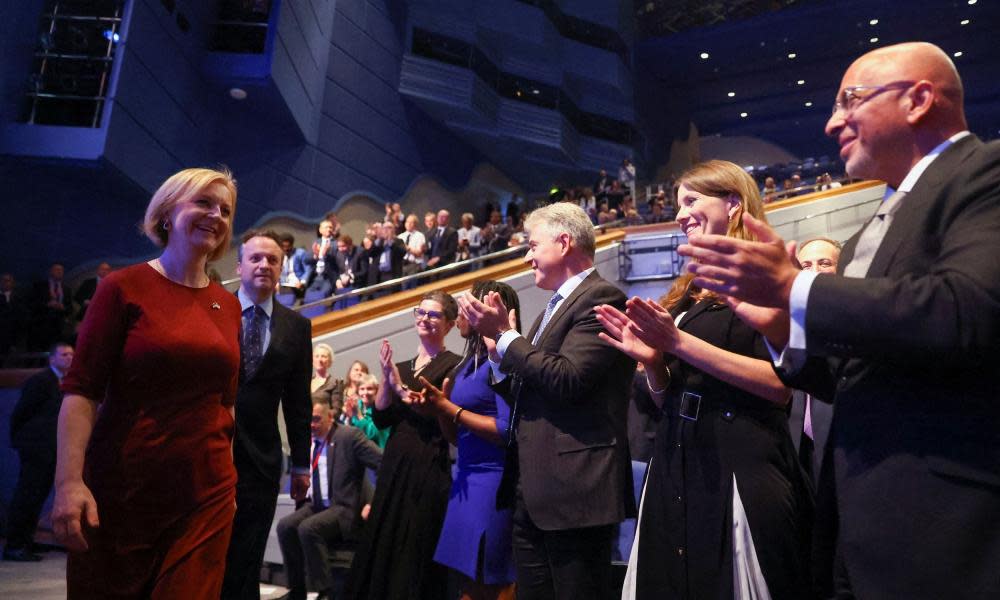The Guardian view on the Tory conference: a carnival of shame

The choice of a new leader was never going to solve problems that have been amassed during 12 years of Conservative government, but even Liz Truss’s fiercest critics have been surprised by her efficiency at making things worse. Her government’s plan for growth seems to be exploding on the launch pad before it has had a chance to take off. On Sunday the former cabinet minister Michael Gove indicated that he would not vote for Ms Truss’s package because it was wrong to be cutting tax for the wealthiest when so many were suffering. It is style as well as substance that is a problem. It looks callous for the chancellor be at a cocktail party celebrating the mini‑budget with bankers who are its biggest winners. The prime minister did say that she had got things wrong. But, rather than a course correction, Ms Truss doubled down.
The party’s annual conference this week was always going to be awkward for Ms Truss when so many Tory MPs preferred Rishi Sunak as a candidate for Downing Street. Healing those divisions is not made easier by the vindication of Mr Sunak’s bleakest forecast of Ms Truss’s plans. It might be too much to expect real contrition from someone who defended Boris Johnson even after he had been driven from office for duplicity and incompetence. Mr Johnson was at least shrewd enough to see the utility in tactical U-turns. His successor prefers a rigid ideological conviction based on theories about market forces that the financial markets are not buying.
Ms Truss and her chancellor have turned the UK into a laboratory for testing the hypothesis that channelling wealth to society’s richest tier and starving the public sector of resources will generate an investment boom of such magnitude that tax revenues will surge even as the tax base shrinks. They are cheered in that endeavour by a small circle of libertarian economists – the same clique who believed, in defiance of all evidence, that cutting Britain off from the EU, its nearest and richest market, would somehow boost trade.
The prime minister knew that she would encounter opposition, including dissent within her party. But the possibility of crippling parliamentary rebellions will test her self-image as a risk-taking maverick, unafraid to take tough decisions. There is also a difference between political criticism and a hostile reaction from the bond market. To make herself unpopular was a problem for the Conservative party. To cost Britain its reputation for informed policymaking is a problem for everyone, although the cost will not be felt evenly.
The mini-budget also marks a return to the dreary politics of austerity. Ministers have hinted that benefits might not be uprated in line with inflation next spring. That would reverse a commitment made (reluctantly) by Mr Sunak, under pressure from Tory MPs who understood that millions of people faced destitution as rising prices shrivelled the purchasing power of their welfare payments. To cut those people adrift in a financial storm would be monstrous – as is the suggestion by the Tory party chairman, Jake Berry, that they ought to get better-paid jobs. That the storm has been whipped up by the government’s own financial mismanagement only adds spite and cynicism to the callousness.
Benefit claimants might be underrepresented at a Tory conference, but the party’s core voters will not be unaffected by the crisis enveloping their anointed prime minister. Their mortgage payments will rise; their NHS services will be further denuded. Few prime ministers achieve the scale of political and economic error in a full term that Ms Truss has committed in a month, and with a flimsier mandate than most. The Tories might quickly regret having chosen her as their leader. Without adjusting their plans or their top team, Conservatives deserve to pay a heavy electoral price for inflicting that misfortune on the rest of the country.

 Yahoo News
Yahoo News 
